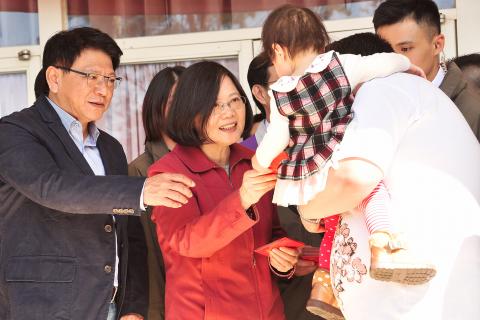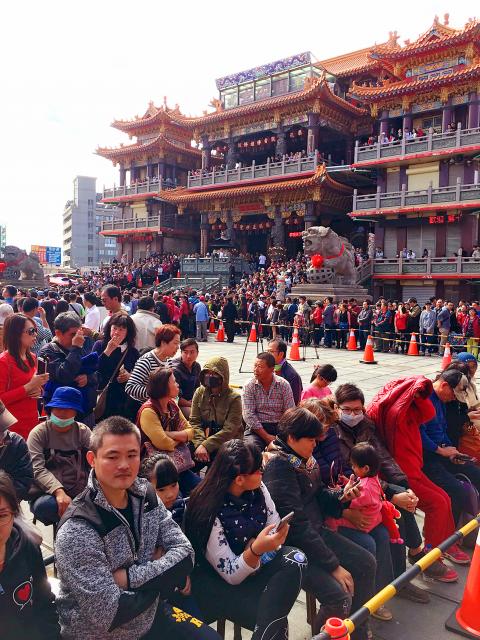Lunar New Year messages from President Tsai Ing-wen (蔡英文) on Twitter yesterday sparked a war of words between Taiwanese and Chinese netizens.
“From the people of Taiwan, we wish everyone a bright and prosperous Year of the Rooster,” Tsai wrote in separate messages in English and Japanese to Internet and social media users.
Her messages drew a torrent of criticism from Chinese netizens, with some leaving vitriolic comments that accused Tsai of pandering to Japan and the US by favoring Japanese and English over Chinese.

Photo: Tsai Tsung-hsien, Taipei Times
Saying that the Japanese do not celebrate the Lunar New Year, a number of the Chinese critics accused Tsai of “selling out to Japan,” while others referenced the oppression perpetrated by the Japanese government during the Japanese colonial era in Taiwan.
Tsai should have tweeted in Mandarin instead, as Chinese characters belong to China, several Chinese said.
However, Taiwanese were quick to argue the claim, with one saying that Hong Kong, Singapore and Malaysia all use Chinese characters.

Photo: CNA
Chinese netizens should “stay out of other people’s business,” another said.
One Taiwanese netizen said that Tsai and Taipei Mayor Ko Wen-je (柯文哲) tweet in English as a means of diplomacy, while another said that most Taiwanese tend to use other social networking platforms more than Twitter.
The Presidential Office said Tsai’s tweet shows the president has a cosmopolitan world view, adding that it was meant to wish all Twitter users a happy Lunar New Year.
People should be magnanimous over the holiday, the office said.
Tsai spent the first day of the Year of the Rooster visiting temples around the nation to ask for blessings from the gods and distributing hongbao (紅包), or red envelopes, each with a NT$1 coin inside, to crowds of people hoping to receive an envelope from her personally.
The tradition of the president distributing hongbao on the first day of the new lunar year was begun by former president Lee Teng-hui (李登輝) in his hometown.
Tsai’s first stop was the Jue Siou Temple (覺修宮) in Taipei, where she made an offering of incense and prayed for the blessings of the temple god. She then proceeded to visit Fu-an Temple in Pingtung County’s Checheng Township (車城), where she handed out red envelopes to the throngs of people who had waited in long lines.
Many in the crowd shouted: “Welcome home, president.”
Tsai also visited Fenggang Village (楓港) in the county’s Fangshan Township (枋山), where her ancestral home is located and where she was warmly received by residents.
“We are glad that President Tsai has not forgotten about the support people in her hometown have shown her,” one resident said.
Tsai also visited temples in Tainan, Chiayi and Kaohsiung.
The outside of Tsai’s envelope featured a rooster along with wishes for a happy new year in Chinese and English and the signatures of Tsai and Vice President Chen Chien-jen (陳建仁).
Additional reporting by Tsai Tsung-hsien and CNA

MORE VISITORS: The Tourism Administration said that it is seeing positive prospects in its efforts to expand the tourism market in North America and Europe Taiwan has been ranked as the cheapest place in the world to travel to this year, based on a list recommended by NerdWallet. The San Francisco-based personal finance company said that Taiwan topped the list of 16 nations it chose for budget travelers because US tourists do not need visas and travelers can easily have a good meal for less than US$10. A bus ride in Taipei costs just under US$0.50, while subway rides start at US$0.60, the firm said, adding that public transportation in Taiwan is easy to navigate. The firm also called Taiwan a “food lover’s paradise,” citing inexpensive breakfast stalls

TRADE: A mandatory declaration of origin for manufactured goods bound for the US is to take effect on May 7 to block China from exploiting Taiwan’s trade channels All products manufactured in Taiwan and exported to the US must include a signed declaration of origin starting on May 7, the Bureau of Foreign Trade announced yesterday. US President Donald Trump on April 2 imposed a 32 percent tariff on imports from Taiwan, but one week later announced a 90-day pause on its implementation. However, a universal 10 percent tariff was immediately applied to most imports from around the world. On April 12, the Trump administration further exempted computers, smartphones and semiconductors from the new tariffs. In response, President William Lai’s (賴清德) administration has introduced a series of countermeasures to support affected

CROSS-STRAIT: The vast majority of Taiwanese support maintaining the ‘status quo,’ while concern is rising about Beijing’s influence operations More than eight out of 10 Taiwanese reject Beijing’s “one country, two systems” framework for cross-strait relations, according to a survey released by the Mainland Affairs Council (MAC) on Thursday. The MAC’s latest quarterly survey found that 84.4 percent of respondents opposed Beijing’s “one country, two systems” formula for handling cross-strait relations — a figure consistent with past polling. Over the past three years, opposition to the framework has remained high, ranging from a low of 83.6 percent in April 2023 to a peak of 89.6 percent in April last year. In the most recent poll, 82.5 percent also rejected China’s

PLUGGING HOLES: The amendments would bring the legislation in line with systems found in other countries such as Japan and the US, Legislator Chen Kuan-ting said Democratic Progressive Party (DPP) Legislator Chen Kuan-ting (陳冠廷) has proposed amending national security legislation amid a spate of espionage cases. Potential gaps in security vetting procedures for personnel with access to sensitive information prompted him to propose the amendments, which would introduce changes to Article 14 of the Classified National Security Information Protection Act (國家機密保護法), Chen said yesterday. The proposal, which aims to enhance interagency vetting procedures and reduce the risk of classified information leaks, would establish a comprehensive security clearance system in Taiwan, he said. The amendment would require character and loyalty checks for civil servants and intelligence personnel prior to